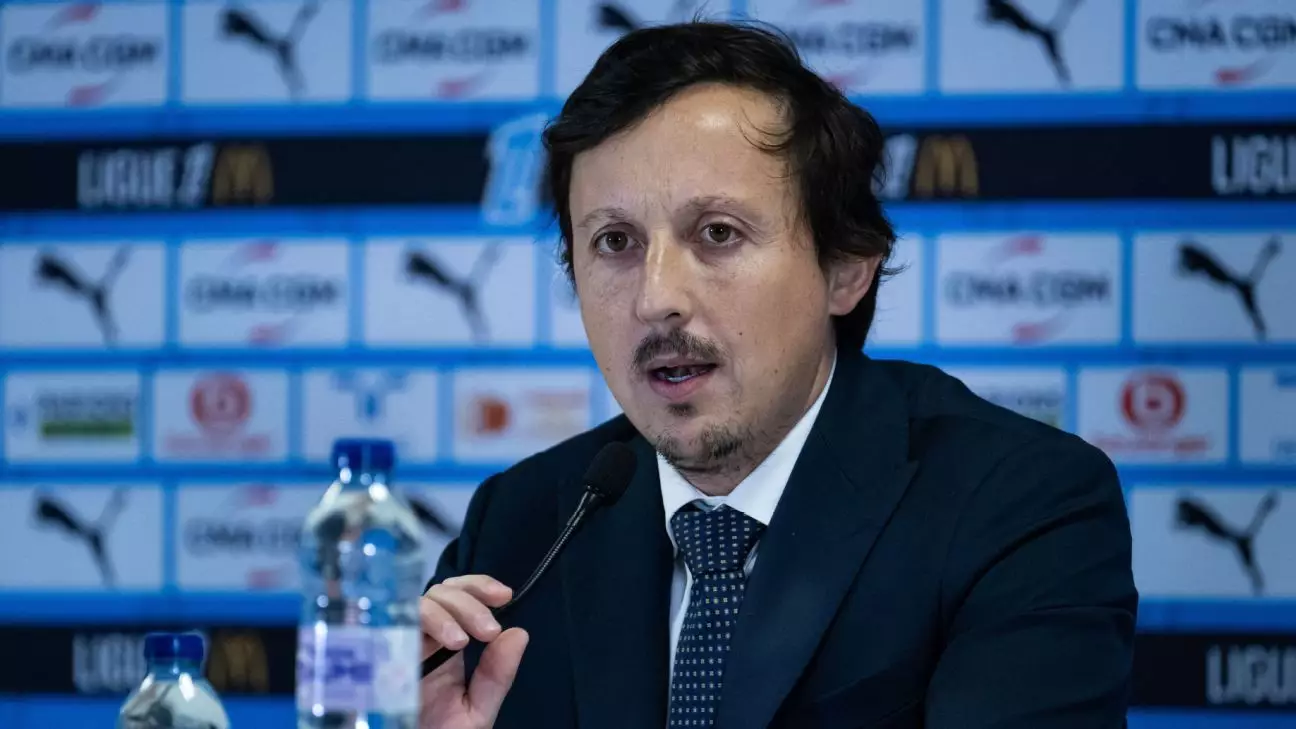In recent weeks, French football has been caught in a whirlwind of controversy stemming from accusations of referee corruption by prominent figures within Olympique de Marseille. This uproar has significant implications not only for the club but also for the integrity of the sport in France. The clashes between Marseille officials and the refereeing community have ignited a heated debate that raises questions about fairness, accountability, and the overall image of Ligue 1.
The friction began following Marseille’s disappointing 3-0 defeat to Auxerre, marking their fifth loss in the league. Frustrated by the ongoing struggles of his team, Marseille President Pablo Longoria broke his typically diplomatic stance by launching a blistering critique of the referees, suggesting that they are engaged in corrupt practices aimed at undermining his club. Longoria’s claims of “true corruption” hinted at an organized conspiracy against Marseille, highlighting a perceived disparity in how officiating impacts teams, particularly against Paris Saint-Germain (PSG), who lead the league by a considerable margin.
Longoria’s accusations did not appear out of nowhere. Throughout the season, Marseille officials have consistently raised questions about officiating standards, yet this latest outcry marked a sharp escalation. Given that your position is steeped in scrutiny, wielding such serious claims about the integrity of referees shifts the discourse from performance on the pitch to ethical questions off it, further complicating the public perception of not just Marseille but the league as a whole.
Support from the French Football Federation
In response to Longoria’s remarks, Philippe Diallo, the president of the French Football Federation (FFF), swiftly condemned the allegations. Diallo emphasized the importance of maintaining the integrity of refereeing, labeling Longoria’s comments as “defamatory, unacceptable, and reprehensible.” This backlash from the FFF underscores the football federation’s commitment to defending its officials against what it perceives as unwarranted criticism. Diallo’s support for referee Jérémie Stinat, who officiated the controversial match, speaks volumes about how governing bodies prioritize the perception of impartiality over individual club grievances.
Moreover, the referee’s union, SAFE, is pursuing defamation lawsuits against Longoria and any parties behind threats received following the match. This legal pursuit adds another layer to an already fraught situation, indicating that the consequences of such remarks extend beyond mere complaints and can potentially involve substantial legal ramifications.
The stakes involved in matches between dominant teams like Marseille and PSG often result in outsized reactions from players, coaches, and officials. As PSG continues to widen their lead in the league, Marseille’s frustrations are amplified, especially in a season where expectations were high. Marseille’s loss, coupled with the contended red card issued to Derek Cornelius, fueled further outrage. While acknowledging their shortcomings, coach Roberto De Zerbi described the decision to send off Cornelius as “scandalous,” a remark indicative of the emotional turmoil that often envelops high-pressure situations.
Ex-players also contribute to the narrative, as seen with Fabrizio Ravanelli, who expressed his disbelief at the officiating decisions made during the game. When former players vocalize their discontent, it reflects a broader sentiment within the club’s culture. It can be viewed as an attempt to rally fan support and galvanize the team in the face of adversity, but it also risks perpetuating a cycle of accusations that diminishes the sport’s credibility.
Ultimately, this controversy raises essential questions about the regulatory frameworks governing football in France. As accusations and defenses collide, critics question how effectively governing bodies manage disputes, ensure fair play, and maintain referee accountability. The ramifications of Longoria’s comments may extend far beyond this season, potentially affecting the long-term reputation of both Marseille and the league itself, particularly if the narrative of corruption persists in public discourse.
As the season progresses, finding a resolution to this tension will be crucial. Football relies heavily on trust—trust in players, trust in officials, and trust within the league. The steps taken in the coming weeks will highlight whether stakeholders in French football are capable of rising above these controversies or if they will become mired in a cycle of blame and defensive posturing, ultimately hindering the sport’s integrity and popularity.

Leave a Reply